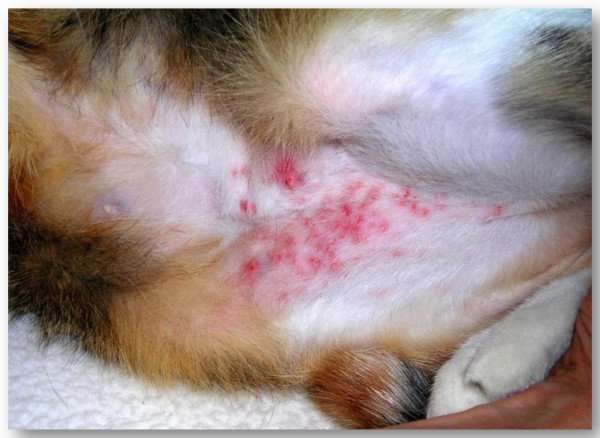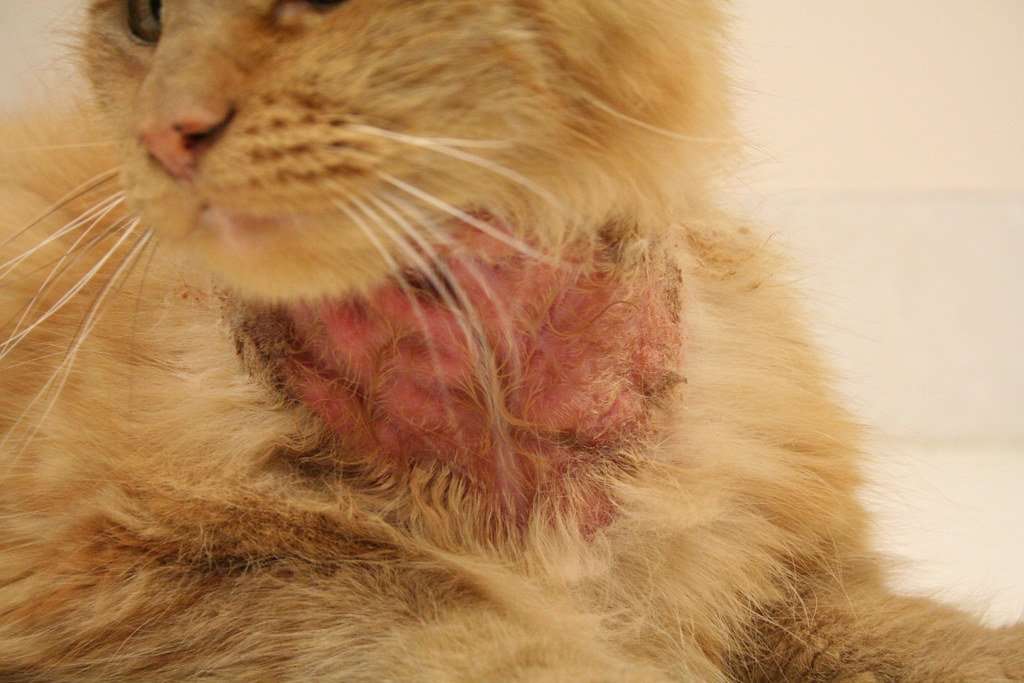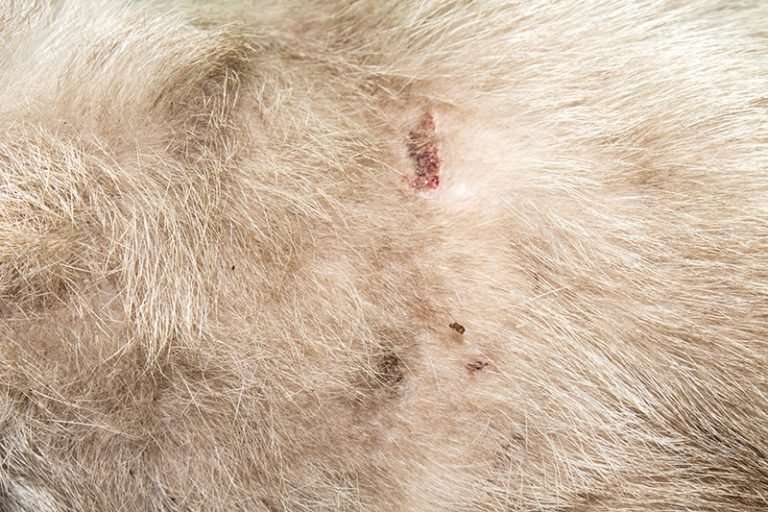Symptoms Of A Flea Allergy In Cats
The most common symptom of a flea allergy in cats is severe itching. This itching, known as pruritis, this side effect can occur with even as few as one or two flea bites. These symptoms may even persist after a treatment has been applied.
The itching most commonly appears to affect the front of the cats body and around the head, however, the lesions brought on by bites can occur all over the cats body. The fleas may not be visible to the human eye, and may not appear with the aid of a flea comb because cats are such thorough groomers, but if the scratching persists, it may still point to a flea allergy.
The symptoms of a flea allergy may be more severe during warm and humid weather, and in similar climates, but even in northern, colder climates and in the colder months, fleas can still continue to populate on your cat due if the animal is spending time in a heated home.
This means that flea allergies can be a chronic, year-round issue that may take a long time to resolve. The animals will scratch, lick, chew, and bite at his skin excessively and cause red, oozing hot spots to appear where they have focused their attention. Cats may even remove large clumps of hair to get at their lesions and find some temporary relief. If their infestation is allowed to grow, they may have tiny flea bite lesions all over their body, particularly on their neck and rear.
How To Treat Flea Allergy Dermatitis
Flea allergy dermatitis is a skin disease that affects the cats and dogs living in the house. Its symptoms are so bothersome for the pets that you feel the need to provide them with quick relief. Read this article for helpful info about how to treat this dermatological problem.
Flea allergy dermatitis is a skin disease that affects the cats and dogs living in the house. Its symptoms are so bothersome for the pets that you feel the need to provide them with quick relief. Read this article for helpful info about how to treat this dermatological problem.
The problem of flea allergy dermatitis arises when your pets fur is heavily infested with fleas. These fleas feed themselves with the blood sucked out from the pets body. While sucking blood, fleas release saliva to prevent coagulation of blood. This saliva is responsible for the allergic skin reaction that leads to dermatitis. In this condition, the pets experience such severe itching sensation that they start scratching and biting their skin. As a result, the skin becomes red and inflamed. Red skin rashes appear on various parts of the body. Too much scratching of these rashes can cause secondary infection in them. If flea allergy dermatitis is left untreated for long, then it can lead to hair loss in the affected part of the skin.
Is My Cat Allergic To Fleas
Your cat is itching like crazy, so of course youre wondering what the deal is.
One possible explanation is flea allergy dermatitis, which means she has an allergy to fleas so imagine the itchiness of fleas, multiplied by an allergic reaction!
The Dodo reached out to Dr. Ursula Oberkirchner, a veterinary dermatologist and owner of Advanced Veterinary Dermatology in Florida, to find out what flea allergy dermatitis is and how it can affect your cat.
Recommended Reading: Cat Age Vs Human
Diagnosis Of Flea Allergy Dermatitis In Dogs And Cats
-
Clinical evaluation for hair loss and presence of fleas
-
Intradermal skin testing
A number of factors must be considered in the diagnosis of FAD, including history, clinical signs, presence of fleas or flea excrement, results of intradermal testing, and exclusion of other causes of dermatologic disease.
Clinical signs associated with FAD are variable and depend upon frequency of flea exposure, duration of disease, presence of secondary or other concurrent skin disease, degree of hypersensitivity, and effects of previous or current treatment. Nonallergic animals may have few clinical signs other than occasional scratching due to annoyance of flea bites. Those that are allergic will typically have dermatitis, characterized by pruritus. In dogs, the pruritus associated with FAD can be intense and may manifest over the entire body. Affected dogs may be particularly sensitive in the flanks, caudal and medial thighs, ventral abdomen, lower back, neck, and ears. Chewing, licking, and scratching of these areas will usually be evident. Hair may develop brown staining from the licking and is often broken off. In extremely hypersensitive dogs, extensive areas of alopecia, erythema, and self-trauma are evident.
Serologic testing of IgE directed against flea-specific salivary antigens can be used to aid in the diagnosis of FAD.
-
Mechanical removal of water-soluble insecticides during bathing or swimming
-
Development of insecticide resistance
Foods Allergy Vs Food Intolerance

Food allergies should be distinguished from food intolerances. Food allergies trigger an immune response, whereas food intolerances dont. Also, a true food allergy can cause anaphylaxis, whereas a food intolerance cant.
Many cats are intolerant to sucrose and lactose because they dont have enough of the enzymes needed to process these foods . The main symptoms of food intolerance include bloating, gas, diarrhea, and itchy skin.
Most cats also digest complex carbohydrates at a slower rate than other animals, but this is not classed as an allergy. A true allergy is characterized by an immune response to a food substance. True food allergies are less common than intolerances, but they still affect up to 5% of cats.
You May Like: Talking Kitty Cat Facebook
Can Cats And Dogs Be Allergic To Fleas
Many cats and dogs are allergic to fleas. In fact, FAD is the most common skin disease in dogs in the U.S. Flea allergies often spike in the summer, and pets that have seasonal allergies are more likely to have an allergic reaction to fleabites. But any pet can get FAD.
Is My Pet Allergic To Fleas
Fleas are a pet owners nightmare, for good reason. Not only do these tiny, wingless pests cause our furry friends to incessantly itch, but fleas can find a home in carpets and beddingand they are a pain to get rid of. And, while a single flea bite can cause any pet discomfort, those with flea allergies can be downright miserable. What is a flea allergy, and how can pets find relief? Lets find out more.
Recommended Reading: Anisocoria In Cats Causes
What To Do If Your Pet Has A Flea Allergy
Flea bite hypersensitivity and flea allergic dermatitis are the most common skin diseases in pets. The saliva from the flea is believed to be the cause of the allergy or sensitivity.
How to spot if your pet has a flea allergy
- Frequent and severe itching and scratching
- Hair loss
- Affects the hind end more than the front of the body
- Fleas or flea dirt may or may not be visible.
How are flea allergies diagnosed?
If your pet has any of the symptoms above, use a flea comb to inspect their hair for fleas or flea dirt. If you cant find any, your vet may recommend a skin test for mites or bacterial skin diseases. Often the best way to diagnose a flea allergy is to simply treat for fleas.
How do I treat my pets flea allergy?
Flea control and prevention is essential for dogs and cats with flea bite hypersensitivity. There are numerous options on the market that kill adult fleas for a period of time, but all should be repeated for continuous flea control.
Spot-on treatments are applied to a small area, usually at the top of the back of the neck where the pet is unable to lick it off. Oral products are also available these may be more useful and practical for you and your pet. Flea shampoos can also be beneficial for young animals or for an acute flea infestation, but continuous management with a long-term product is essential.
Its a good idea to discuss costs with your vet before you start any treatment.
How do I avoid flea allergies reoccurring?
How helpful was this advice?
Cat Flea Allergy Symptoms & Management
Fleas are annoying pests that bite our pets , feeding on blood. They carry diseases and the saliva in their bites often leads to a cat flea allergy symptoms developing. An allergy to flea bites causes Flea Allergy Dermatitis . This is a fancy term for the skin problems resulting from the allergic reaction to flea saliva.
Cats, dogs, and humans can all react, but the way it shows up on the skin looks different. The hallmark in all of them is that it creates a very itchy cat or dog. FAD is the most common skin disease in pets in the world.
Dont assume your cat cant have fleas because you live in a high-rise apartment and your kitty has never touched a paw on grass. Fleas have a way of hitchhiking on humans to reach your kitty inside. Anyone can have fleas in their home!
Also Check: What Color Is Pete The Cat
Recommended Reading: Are Collars With Bells Bad For Cats
What Is A Cat Flea Allergy
Cat fleas can cause allergic reactions in both cats and in other animals such as humans or dogs. The flea injects compounds into the cat’s skin when it bites, and the cat’s immune system reacts to these compounds. The cat flea allergy causes the cat to itch and scratch and affects the condition of the skin. The allergy is technically known as flea allergy dermatitis .
Ctenocephalidesfelis is an example of a cat flea. According the the Merck Veterinary Manual,C.felis is the most common cause of fleas in cats and dogs in North America. The cat flea allergy can also occur in humans. Not every cat, dog, or human will show cat flea allergy after a bite.
When a flea bites a cat, it injects its own spit into the bite. This saliva contains compounds that the immune system targets and reacts to. A bite stimulates production of immunoglobulin E and IgD antibodies that are specific to the flea antigens. It also produces a localized inflammatory reaction.
The immune system can react immediately, and an allergic reaction happens after 15 minutes. Alternatively, the reaction can take one or two days to occur, which is known as a delayed reaction. In some cases, both the immediate and the delayed reactions can occur. This may the mechanism of how cat flea allergy works in felines.
Is It Ok For My Cat To Itch After Flea Treatment
Yes, it can sting or itch. At the very least, the sensation of wetness may startle her. Check the site where you apply it and make sure there are no bald spots or flaking. If so, you may need to change brands. If she does have irritation, check with the vet, as most products use varying amounts of the same ingredient.
Recommended Reading: How To Get Cat Pee Out Of Hardwood Floors
Flea Bite Hypersensitivity In Cats
Flea bite hypersensitivity or flea allergic dermatitis is very common in felines. In reality, it is the most typical skin disease to be identified in animals. Flea allergies typically develop when felines are young , however can begin at any age. Flea saliva is really believed to be the cause for the allergic reaction or level of sensitivity.
The flea life process consists of the adult flea, egg, larva and pupa. Adult fleas do bite, but can not survive long if they are not on an animal. When the adult flea lays its eggs on the host feline it will fall off, leaving the eggs to mutate through the rest of their life cycles. The remainder of the fleas life cycle then occurs on the host cat, and the generational cycle continues and grows till the flea population has actually been eradicated totally.
What Is The Best Way To Treat My Rabbit For Fleas

There is a rabbit-specific treatment for fleas that your vet can recommend, but since fleas can also infect dogs and cats, you must treat all pets in your household. If you can only see a few fleas, a flea comb dipped in warm, soapy water or rubbing alcohol to drown the fleas may be enough to get rid of them. If the infestation is more severe, a harmless topical solution may be required, usually applied to the nape of the neck where your rabbit cannot lick.
Avoid flea baths, flea baths or powder not only are baths very tiring for rabbits, the chemicals used are often toxic to them.
Your veterinarian can advise you on treatment and remember if you have other pets in the household they will also need to be treated.
Read Also: 13 Cat Years In Human Years
What Are The Signs Of An Allergic Reaction To Fleas
Allergic reactions to fleas typically occur from contact with the anti-coagulant that the flea injects into the bite, or to other animals bitten by the flea in the past. Signs of an allergic reaction to fleas may be a more severe bite, a red rash at the site, or in severe cases, hives and swelling. Bites are located in clusters and may be a white or red bump. Prevention means treating the source of the fleas, and alleviating the itching until the bite heals.
Most people will not see just one bite, but several in clusters. Usually bites are located near where elastic bands rest on the body, such as around socks and underwear. The bite will appear as a a slightly raised bump, with either a white or red tone. There are several insect bites that look like a bite from a flea, but are actually from another bug such as bed bugs and flies.
An allergic reaction to fleas is usually not an allergy to the flea itself, but to chemicals in its saliva, which act as an anti-coagulant to blood flow. In addition, people with allergies to dogs or cats may have a reaction to the dog or cat that was bitten in the past by the same flea. Most likely, allergic reactions will appear as just a larger, itchier bite.
Is It Safe To Give A Dog Flea Treatment
Many flea treatments for dogs are toxic for cats. Ingredients like permethrin are commonly included in dog flea and tick treatments, which can actually kill cats. Always follow the instructions on the products label with regards to dosing amounts and frequency unless otherwise directed by your veterinarian.
You May Like: How Many Cat Years To A Human Year
Can Cats Be Allergic To Flea Bites
A large number of cats and dogs are allergic to fleas. FAD is the most common skin disease in dogs in the United States. The summer is a time when flea allergies spike, and pets with seasonal allergies are more likely to have an allergic reaction to flea bites. FAD can be found in any pet, however. There are a number of things you can do to help.
Adverse Reactions To Cat Flea Products
Adverse reactions to topical veterinary-prescribed flea treatments are rare but can happen in some cats. Topical flea products have made the treatment of fleas, ticks and parasitic worms so much easier than tablets and pastes. These products are applied to the skin on your cats neck once a month, or as directed.
Common topical flea products includeFrontline, Revolution, Program andAdvantage.
Recommended Reading: What Was Hp Lovecraft’s Cats Name
Outlook And Ongoing Care
Fortunately, with treatment your cat is likely to live a normal, happy life. Their treatment for FAD will need to be ongoing, but this is likely to be as simple as strict flea control and keeping an eye out for flare-ups. If your cat has a flare-up, contact your vet straight away, before it has a chance to get any worse.
What Happens If You Leave Fleas Untreated
Left untreated, fleas can multiply rapidly and make your dog seriously ill. Thats why its important to check your dog for fleas on a regular basis and act quickly to eliminate any outbreaks that occur. Some dogs are severely allergic to flea saliva and can experience extreme discomfort even from a single flea bite.
Don’t Miss: Cat Urine Stained Wood Floor
How Can I Soothe Flea Allergy Dermatitis
Your veterinarian has topical, oral and injectable treatments to help ease the itch. Because the constant itching and clawing can cause infections, your vet may discuss using antibiotics to treat those issues as well. For a cat that’s not water-averse, a cool bath at home can also temporarily soothe the skin.
Signs Your Pet Has Flea Bites

Fleas are parasites that feed on blood. Cats and dogs make perfect host for bloodsuckingfleas because they are warm and furry and make a comfortable nest for fleas andtheir eggs. Flea bites can cause serious itchingand skin inflammation because flea saliva is an allergen. If you ever had a flea bite you probably recall scratchingthe spot only to intensify the itch. Oh,the torment of flea bites! Now imagine how poor bowwow and tomcat feelswhen they are overrun by fleas
Read Also: How Do You Make Cat In Little Alchemy